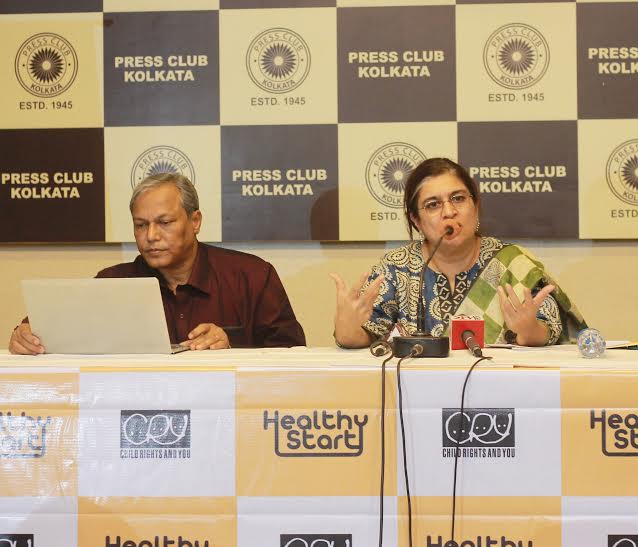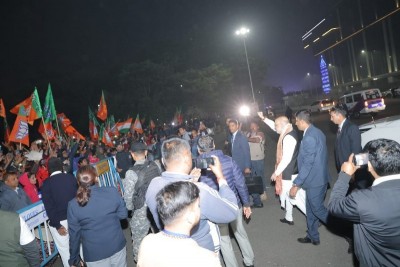
Half of the children in Kolkata slums are underweight: CRY
The children do not fare any better with respect to the access to early childhood healthcare either, with more than one-third of them still remaining out of complete immunization cover.
The household sample survey called “Are Children Getting A Healthy Start” was conducted to map the health, nutrition and education status of children below six years across five metropolitan cities namely Kolkata, Delhi, Mumbai, Chennai and Bangalore.
indings of the survey reveal that the slums in the five metros do not show a positive trend with respect to child nutrition. While Chennai has the most number of children battling malnutrition in its slums with 62.2% being underweight, Kolkata and Delhi slums are just in the midway in tacking urban child malnutrition with 49% and 50% underweight children.
Bangalore and Mumbai, however, fare slightly better, with 33% and 41% children found to be underweight respectively.
Findings also reveal that among the 49% children with low birth-weight across the Kolkata slums 33% are severely malnourished, which indicates at a worrying child malnutrition scenario of the city.
Immunization being the two most critical components for children’s survival in the first six years of their life, vaccination status in the slums of Kolkata falls short of expectation.
Even though the scenario has fairly developed in the past few years, more than 40% children are yet to be brought under complete immunization coverage, as revealed by the findings of the sample survey. 58% of the surveyed children have received at least one dose of recommended vaccination.
There is also a slight gender-imbalance evident in the collected data with 61.2% boys within 1-3 years age-group being fully vaccinated, while in case of girls it is about 56.5%. However, Delhi fares much worse than Kolkata in this regard, with less than one third of the children fully vaccinated (about 31%) under the age of three years.
Even as Aanganwadi Centres (AWCs) remain one of the most important institutions for ensuring nutrition, health and early education of children below 6 years, close to 20% of the surveyed children dwelling in Kolkata slums are evidently out of its reach. The ICDS scheme also provides for health services including de-worming, IFA (Iron-Folic Acid tablets) and Vitamin A supplementation. Figures show gaps in access to vitamin A, de-worming and IFA supplementation in the Kolkata slums, with close to 60% of the surveyed children remaining out of Iron-Folic cover. Vitamin A and de-worming tablets reached to 69% and 61% of the surveyed children respectively.
There are other areas of concern with respect to ICDS service delivery provisions. Findings of the sample survey suggests that 87% of the respondent parents were fairly happy with the way growth monitoring of children is regularly done in the ICDS centres across the city, but more than 45% of parents reported that they do not get regular and proactive feedback from the centres. More worrying is the fact that 76% of the respondent parents reportedly were not at all informed by the AWC that their ward was underweight and needed to be taken to NRCs or hospitals.
However, with respect to indicators like birth registration and breastfeeding, Kolkata does fairly well, as per the survey findings. The city has the second highest birth registration rate with a satisfactory 85.1%, among the five metros surveyed, and 94% of the surveyed children in Kolkata slums are found to be breastfed at birth or on the same day.
Puja Marwaha, CEO CRY said, “Early childhood, spanning from birth to the age of six years, is the crucial period when the foundations of cognitive, physical and socio-emotional development, language and personality are laid. It is also the phase of maximum vulnerability as deprivation can seriously impact a child’s health and learning potential. Therefore we need to ensure that children in this age group get the best of nutrition, health and learning.”
“CRY strongly recommends that health, nutrition and care to children should be provided as entitlements. Nutrition security of these children should be addressed with urgency. Alternate care arrangements like crèches for all children are a non negotiable in light of informal economy in urban slums where both parents are compelled to work for sustenance,” she added.
Even though the findings are based on a limited sample size and hence are not reflective of the overall situation of all urban slums in the city, it can certainly throw light on patterns and trends that may exist across slums in the cities. And trends in the state capital indicate that there are gaps in terms of provisions and outreach”, said the organizers.
The study forms a part of ‘Healthy Start’ initiative by CRY, which is focused on the importance of ensuring children in the age group of 0-6 years do receive essential care, nutrition and education. Within the ambit of Healthy Start, CRY has launched ‘Get Healthy Give Healthy’ campaign which is about encouraging people to support a healthy start for young children, while working towards a personal health goal.
For more information, log into: www.justearthnews.com
Support Our Journalism
We cannot do without you.. your contribution supports unbiased journalism
IBNS is not driven by any ism- not wokeism, not racism, not skewed secularism, not hyper right-wing or left liberal ideals, nor by any hardline religious beliefs or hyper nationalism. We want to serve you good old objective news, as they are. We do not judge or preach. We let people decide for themselves. We only try to present factual and well-sourced news.







